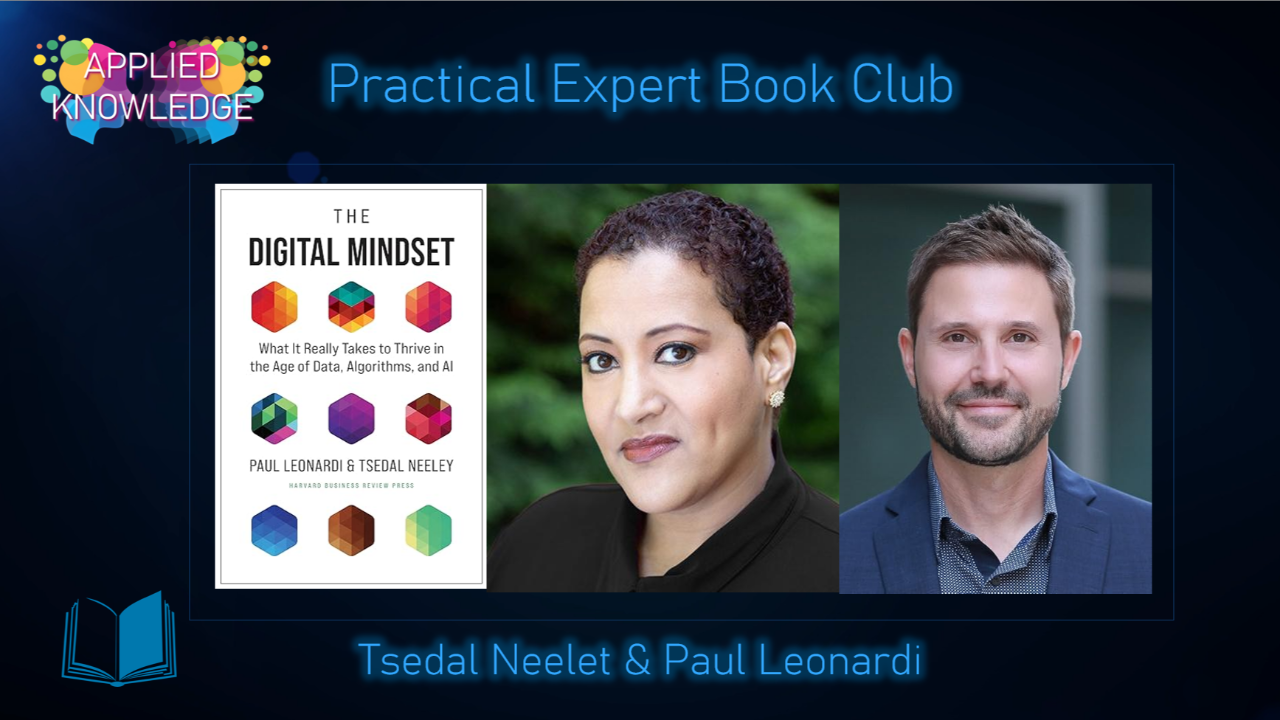The Digital Mindset: What It Really Takes to Thrive in the Age of Data, Algorithms, and AI" by Paul Leonardi and Tsedal Neeley
Oct 02, 2024
"The Digital Mindset: What It Really Takes to Thrive in the Age of Data, Algorithms, and AI" by Paul Leonardi and Tsedal Neeley is a comprehensive guide for individuals and organizations looking to adapt and thrive in the rapidly evolving digital landscape. The authors, both esteemed professors with extensive experience in technology and organizational behavior, offer insights into how digital technologies are transforming the way we work and how we can harness these changes to our advantage.
Key Themes and Concepts
- Understanding the Digital Mindset
- The book starts by defining what a digital mindset is: the ability to see possibilities enabled by digital technologies, to continuously learn and adapt, and to embrace new ways of working and thinking.
- It emphasizes the importance of being open to change and being proactive in learning about new technologies and their applications.
- The Three Key Dimensions
- Collaboration: Emphasizes the importance of leveraging digital tools to enhance collaboration within teams and across organizations. This includes using communication platforms, project management tools, and collaborative software to improve efficiency and innovation.
- Computation: Focuses on the ability to work with data, understand algorithms, and utilize artificial intelligence. It stresses the importance of data literacy and the need for employees at all levels to be comfortable with data analysis and interpretation.
- Change: Highlights the necessity of being adaptable and agile in the face of technological advancements. It encourages a culture of continuous improvement and learning to stay ahead in the digital age.
Practical Tips and Applications
- Building Digital Skills
- The authors provide a roadmap for individuals to build their digital skills, starting with self-assessment to identify areas of strength and weakness.
- They suggest practical ways to upskill, such as taking online courses, participating in workshops, and engaging in hands-on projects.
- Fostering a Digital Culture
- The book underscores the importance of creating a digital-friendly culture within organizations. This involves encouraging experimentation, supporting innovation, and fostering an environment where failure is seen as a learning opportunity.
- Leaders are advised to model digital behaviors, provide resources for digital learning, and recognize and reward digital achievements.
- Leveraging Data and AI
- Leonardi and Neeley provide detailed guidance on how to leverage data and AI to drive business decisions. This includes understanding the basics of data analytics, identifying key metrics, and using AI tools to gain insights and improve processes.
- The book also addresses common challenges and misconceptions about AI, providing practical advice on how to overcome these obstacles.
- Enhancing Collaboration
- The book offers strategies to enhance collaboration through digital tools. This includes choosing the right platforms, establishing clear communication protocols, and ensuring that all team members are proficient in using these tools.
- The authors also discuss the importance of cross-functional teams and the role of digital tools in breaking down silos and fostering innovation.
- Navigating Digital Transformation
- The authors outline a step-by-step approach to digital transformation, starting with a clear vision and strategy, followed by the development of a digital roadmap, and finally, the implementation and continuous evaluation of digital initiatives.
- They emphasize the importance of aligning digital transformation efforts with the overall business strategy and involving all stakeholders in the process.
Case Studies and Examples
Throughout the book, Leonardi and Neeley provide numerous case studies and real-world examples to illustrate their points. These include:
- Successful Digital Transformations: Examples of companies that have successfully navigated digital transformations, highlighting the strategies they used and the challenges they faced.
- Innovative Use of Technology: Stories of how organizations are using digital tools and AI to drive innovation and improve performance.
- Leadership in the Digital Age: Insights into how leaders can inspire and guide their organizations through digital change, including practical tips and strategies.
Relevance to Your Work Environment
As a clinical psychologist involved in mental coaching, performance analysis, and therapy, the concepts in "The Digital Mindset" can be highly relevant:
- Enhancing Patient Engagement
- Utilize digital tools to enhance patient engagement and therapy outcomes. This can include telehealth platforms, mobile apps for mental health tracking, and AI-driven tools for personalized treatment plans.
- Data-Driven Insights
- Leverage data analytics to gain insights into patient behavior, treatment efficacy, and overall mental health trends. This can help in tailoring interventions and improving patient outcomes.
- Collaboration and Communication
- Improve collaboration with other healthcare providers, psychologists, and psychiatrists using digital communication platforms and collaborative tools.
- Continuous Learning
- Stay updated with the latest advancements in digital health technologies and continuously adapt your practices to incorporate these innovations.
In summary, "The Digital Mindset" by Paul Leonardi and Tsedal Neeley offers a valuable guide for individuals and organizations looking to thrive in the digital age. By embracing a digital mindset, building relevant skills, fostering a supportive culture, leveraging data and AI, enhancing collaboration, and navigating digital transformation effectively, readers can position themselves and their organizations for success in a rapidly changing world.
Disclaimer: The content of this “Breakdown Analysis” is based on my interpretation and experience with the book "The Digital Matrix" by Venkat Venkatraman. While I strive to accurately represent the core concepts and insights presented by the author, the views expressed here are my own and may not be 100% aligned with the author's original point of view. I have also supplemented the discussion with my own experience and knowledge to fill in any gaps and provide additional practical knowhow. As such, listeners should refer to the original text for the author's complete perspective.
This is a taster to the Business Transformation Insight-Nexus Community site, which is the gateway to mastering and applying cutting-edge strategies in your organization. Dive into curated business books, engage with thought leaders through exclusive podcasts and courses designed to turn insights into action.

